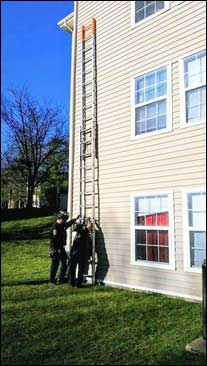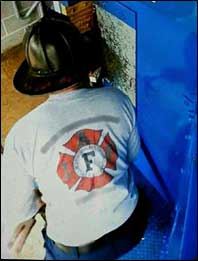By Bill Schnaekel
Photos by author
Prior to being assigned to a permanent position, I served as a relief lieutenant for more than four years. The position came with a host of advantages and disadvantages. I work in an organization that is both young and large and I would frequently fill in for a captain on any one of 38 engines. Whether I knew the members I was with or not, we would make it a point to train on something, anything, big or small. I’d set the stage early in the morning, often after equipment check by asking how well they knew the engine. Often, they would proudly proclaim that they couldn’t be stumped. This didn’t come as a surprise since I work with some of the most highly trained firefighters in the country. I would have to curb my enthusiasm until we got out on the street, though.
I’d give it until around noon and if we hadn’t run a call to take advantage of the opportunity to train, we’d create one after the members had lunch. It would be short enough to maintain attention, applicable enough to motivate them to buy in and show others, and not too labor intensive. It was never about beating the firefighters up or exhausting them, especially since they weren’t even a quarter of the way through the 24-hour shift. Above all else, I tried to make it relevant. We owned it and we were the best company there was, regardless of the unit we were on.

Motivated by the “Our Lady of Angels” fire, it wouldn’t take long before I was standing below a third-floor window asking my two bucket (jumpseat) firefighters if the 24-foot ladder we carry on the engine would reach the windowsill for rescue (1). The perspective changes drastically from when you’re standing at a distance. If there was any question at all, I’d tell them to do it. Obviously, we’d get permission beforehand and make every effort to minimize the risk, but this far outweighed the cost of only minimally preparing them before they’re called upon to do this for real.
RELATED FIREFIGHTER TRAINING
Go High: Rungs Above the Roofline
Ground Ladders, Not Just for Egress
We Must Demand Excellence of Ourselves
We were all set. I was doing what I could to ensure they were not only continuing to follow orders, but that they were thinking for themselves. Pride and humility were the only things that stood in my way, not so much on their part but at the very least on mine.
Of course, this didn’t occur to me until I was training a perspective lieutenant who was riding as part of our minimal staffing and I was riding behind her. We were out in our district, and she was doing a phenomenal job. The computer-aided dispatch chirped and a residential high-rise fire populated the screen. Perfect. We were right around the corner and the first to arrive. The numbers of this particular building were odd as one street carried an address for ground floor up, but the rear carried several addresses on the lowest level, one floor below, and on a different street entirely. The only reason I mention this is to reiterate the importance of knowing the structures in your first-due response area, not just the streets.
As I approached the door, I could see through the living room window that there was a moderate amount of lightly colored smoke. Not knowing if someone was inside as visibility was low, I made the decision to force the door as opposed to going through the lock. I tried to be somewhat delicate so I didn’t shatter the glass but there was an objective to get in as fast as I could. It was difficult to read the apartment layout and I didn’t know what was on fire. The engine was positioned on the opposing parallel street and were in the process of stretching a long line. I stuck the adz end of the halligan between the wooden door and stop. It felt like all eyes were on me but I’m sure they were all performing their own individual tasks. I pushed the bar upwards, away from the spike or pick end, and that’s when I felt the stop split in half. It caught me so off guard that I was temporarily dumbfounded. With all my training, how could this have happened? Humility, or lack thereof, is the only answer I can think of. The incident was over rather quickly and thankfully no one was inside. The experience was enough to humble me to say the least. I thought about it afterwards quite a bit and realized I fell victim to my own device (2).

It is not my intention to highlight or sell one specific product over another but Mike Perrone, proprietor of Firehouse Innovations, warned about this very thing in one of his training videos. That’s when it hit me. It’s not about the locks, the doors, or the props. It’s also not so much of a “failure to train” or even “training to fail” as it was my failure to adapt and overcome. I failed to be more flexible. I know the difference between focus and tunnel vision but was blindsided by pride. I had made up my mind that I was going to force this door alone. I was trained to do this and made a conscious decision, at least initially, that I didn’t need anybody else’s help. Therein lies the problem. While most of us remain accountable for our actions, we could all use a dose of humility these days. I couldn’t tell you how many times before this incident I watched two firefighters butt a 24-foot ladder against the wall before raising it. Why? Because I set them up and they were trained to do it by themselves. I wanted to remind them of the importance of seeing the bigger picture. This is a good thing, isn’t it? It is when I remember to take my own advice.
I totally agree that with so many priorities on the fireground, we should practice doing things ourselves and there’s seldom any reason to deviate from that. But when there is enough help, it becomes just as important to be proficient as when there isn’t enough help. As an observer, I had the luxury of watching this occur repeatedly. I had no idea at the time that I would fall victim to it myself. My point is this: practice both. It’s nothing the experts haven’t been suggesting all along.
Remember that throwing an extension ladder is still considered an “emergency raise,” but we should all be so skilled that we know we can raise a 28 or even a 35 by ourselves, without fail. Be proficient both with and without resources, and don’t let anyone else tell you otherwise. Regardless of whether you’re forcing entry, throwing ladders, stretching a line, or searching, learn from my mistake. Set your pride aside and see it for yourself. Don’t take my word for it. Ask any firefighter to throw a ladder and they’ll do it again and again, no problem. Throw another member into the mix without either one of them knowing the objective, and I can almost guarantee they will revert to muscle memory and attempt to do it themselves, taking unnecessary steps and wasting valuable time. It’s silly and unprofessional; like a scene from Nelson Fire Department in the movie “Roxanne.”
I’m not suggesting we abandon focusing on techniques we can perform ourselves or even that we should practice using available resources, more often than not. Don’t take it out of context. I am, on the other hand, suggesting that there was once a time when we collectively admitted: “We can and should be able to do this by ourselves.” What reason would we have to say we flopped when we had more help?
Bill Schnaekel is a fifth-generation firefighter and a 4lieutenant with the Fairfax County (VA) Fire and Rescue Department, where he has worked since 1998, 100 years after his great-great grandfather entered the fire service. He has had eight other relatives in the fire service since 1898, seven of which were career. A nearly 30-year veteran, Schnaekel has taught on the national circuit, including FDIC HOT, and is currently assigned to the fire and rescue academy.
In February 2013, Schnaekel created the Facebook Page “Holding1and1,“ a resource to discuss fireground operations and firefighter interests with his friend, Lieutenant Mike Dowling.
MORE BILL SCHNAEKEL

